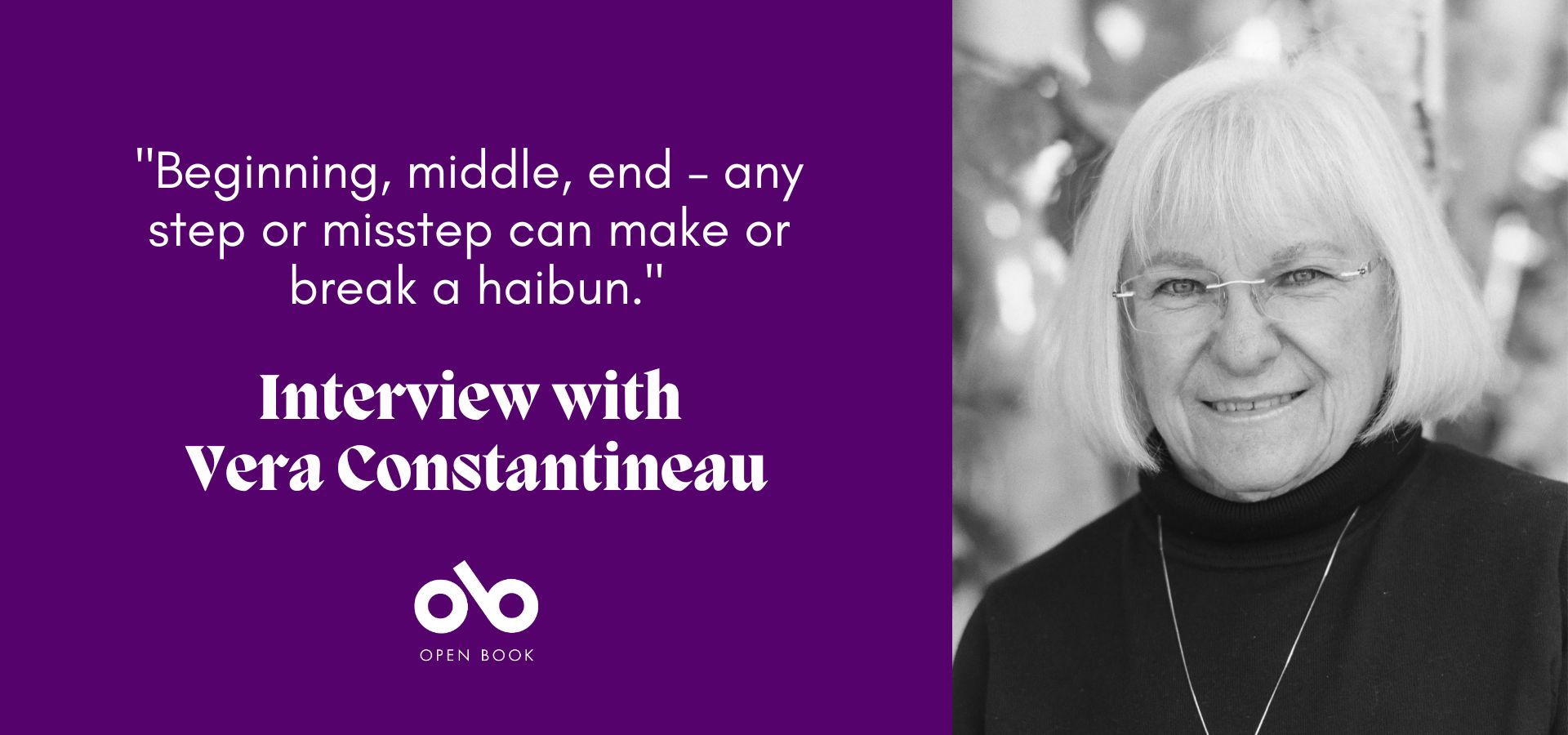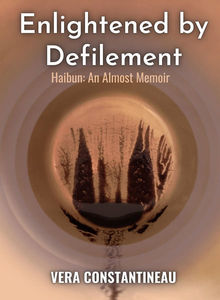Vera Constantineau on the Haibun Form & Finding Poetry in Buddhism's 108 Defilements
While Catholicism has its seven deadly sins, Buddhism gets a lot more specific, with a whopping 108 temptations that practitioners seek to avoid. Alternatively translated as impurities, vexations, or defilements of the mind, each one represents a lesson or opportunity to calm and cleanse the mind and spirit, potentially leading to Nirvana. Things like anxiety, fear, anger, and jealousy are included as well as more specific items like insidiousness, intolerance, and intransigence.
Vera Constantineau, former poet laureate for the City of Greater Sudbury, took this concept as a place to start her own journey, both on the page and in life. The result is her thoughtful and gently witty collection Enlightened by Defilement (Latitude 46 Publishing), referred to as "an almost memoir". Reflective of Constantineau's lifelong pursuit of enlightenment and understanding, Enlightened by Defilement is a collection of haiku and haibun poems that unravel grief, loss, and joy with an open, self-aware heart. The haibun form is the somewhat less common cousin of the haiku, combining the haiku with prose poetry. Famed 17th century poet Matsuo Bashō is credited with inventing the form.
Rich and wise, funny and sharp, Constantineau's poems examine the path to understanding that arcs through the everyday. We're speaking with her today about the collection and the haibun form. She tells us about how she became interested in the 108 defilements, the precise and careful writing process demanded by the haibun form, and her advice for emerging and aspiring poets.
Open Book:
Can you tell us a bit about how you chose your title?
Vera Constantineau:
I was researching for a haiku project when I found a list online titled, 108 Defilements. The list covered the undesirable behaviours/traits a practicing Buddhist must overcome in order to be enlightened. Some examples of the 108 are gluttony, avarice, vanity, and haughtiness. In its content, the list seemed to be an extended version of the ten commandments and the seven deadly sins. I went back to my research and eventually left the site, however, that word defilement stuck in my head. Having read the list of defilements and their particulars, I began to think each of us might have had a taste of defilement sometime in our life. If that’s so, hopefully in this age of self awareness, we are able to move past the experience. In writing these pieces, I attempted to show myself, as non-Buddhist, doing just that—moving past defilements delivered to me in my life. I’m nowhere near enlightened, but that wasn’t ever my aim. I did, however, come through the writing of this collection with a stronger sense of self awareness and acceptance of the lessons I’ve learned. I can admit, some lessons were learned the hard way. The title, Enlightened by Defilement, came from the realization that life is a rocky road. If I am in any way enlightened at this point in my life, then I became so by overcoming.
OB:
What was the strangest or most surprising part of the writing process for this collection?
VC:
The biggest surprise was the growing feeling of peace and healing. Through self examination, I was able to let go of anger and blame, and I achieved a stronger sense of forgiveness, not only for others, but also myself. Delving into my own memories and their connected subjects was difficult but gratifying. Much of the darkness of my thoughts I’d studiously avoided talking about. I certainly didn’t want to be writing about things I was unable to say aloud. Then, I focused on a few hard questions, one being why events are visited on us and another, what the motivation was for another human to inflict pain or unhappiness on us. Working out the answers was the seed that sprouted the beginnings of peace, healing, and eventually forgiveness. What a surprising gift this collection was to myself, I am grateful for it. That is not to say, all my memories were dark, many were enjoyable and still carried a lesson.
OB:
Did you write poems individually and begin assembling this collection from stand-alone pieces, or did you write with a view to putting together a collection from the beginning?
VC:
Once I considered the possibility that I had ‘defilements’ of my own and survived them, I wrote specifically in that vein for this collection. I began, as we all should, at the beginning. My mothers, my extended family, the love and kindness, the ugliness and unkindness. I cut a cross section and aimed for balance, a life is not all bad or all good. My purpose was not to practice blame at any time. I wrote of human beings exhibiting human behaviours. I covered our flaws as I recognized them and in doing so, I tried to tie each written piece loosely to one of the 108. At no point did I ever intend to mimic the difficult and heartfelt journey of a practicing Buddhist.
OB:
What's more important in your opinion: the way a poem opens or the way it ends?
Your CanLit News
Subscribe to Open Book’s newsletter to get local book events, literary content, writing tips, and more in your inbox
VC:
Wow, opens or ends? That’s something of a loaded question when you’re asking about a haibun. Every step along the writing way holds significance in its own right. There’s the title, pored over and considered because it’s an introduction to subject. In some cases it’s a tease of what is to follow. The prose or the story, is absolutely not to be treated as a repetition of the title, more perhaps as the answer to a question the title may pose and hopefully it has delivered on the tease, if that’s the chosen direction of your haibun. Finally, the haiku is meant to take you from the prose to the ‘what happened then’ moment of closure. Beginning, middle, end – any step or misstep can make or break a haibun. It pays to pay attention the whole.
OB:
What were you reading while writing this collection?
VC:
I read a number of haiku journals such as, The Haiku Canada Review, Modern Haiku, Frogpond, Failed Haiku, Seashores, First Frost, Acorn, and bottle rockets. Haibun journals were high on my reading list as you can imagine. Sean O’Connor, the founder and editor of The Haibun Journal in Ireland, writes dazzling haibun, his collection Fragmentation is a favorite. Roberta Beary is my all time favorite haibun writer, it was one of her haibun in Rattle that solidified my commitment to the form. I read a variety of collections by well-known poets in the haiku community in Canada, the U.S., and the UK. I gathered and read educational materials, particularly essays on the genre, that repeatedly stressed the importance of each element in the writing process, particularly that of using your senses in all writing of the Japanese forms. As I said, I was making a specific path through the writing of this collection and each step was taken using the knowledge and words of others to guide me to my own words.
OB:
Who did you dedicate the collection to and why?
VC:
Enlightened by Defilement is dedicated to my husband and my daughter. Those two are my support system, my biggest fans, and the two people who know exactly what to say when I lose my way or doubt myself and when to hug me when I’m down. Enlightened by Defilement has a continuous thread of family, love, and support running through, as well as humour, so does my life with my immediate family. I can’t imagine dedicating it to anyone else, family first. That said, the dedication could have been a lifetime of names. Friends now and past, extended family, the in laws, and the outlaws. Everyone brought me something and I hope I have given back in kind.
OB:
What advice would you give to an emerging or aspiring poet?
VC:
The advice I would give to emerging or aspiring poets is first to read the work of other poets with an eye to what you relate to. When you find the kind of work you wish you’d written, then chances are you’ve found the kind of poetry you want to write. Second, pay attention to what a poem deserves, and here I refer to craft: learn your craft. Third, find a writing circle of like poets and build the sort of trust that allows you to heed good advice and gives you the strength to recognize and ignore bad advice when it comes your way.
_________________________________________
Vera Constantineau’s poetic focus is in Japanese forms, haibun, haiku, senryu, and tanka. In addition to poetry, her nonfiction essay, "Options", is included in Against Death—35 Essays on Living (Anvil Press, 2021). In 2021 her haiku placed third in the Martin Lucas Haiku Award “Presence Haiku Journal” in Britain. Her essay "He and I" placed third place in the 2021 Northwestern Ontario Writers Workshop Creative Nonfiction prize. Her short fiction and haiku have appeared in journals around the world including; Canada, Japan, USA, UK, India, and Europe. She is a member of the Sudbury Writers Guild, Haiku Canada, Haiku Society of America, and Tanka Canada. She served as the sixth poet laureate for the City of Greater Sudbury (2020-2022). She lives in Sudbury with her husband.





